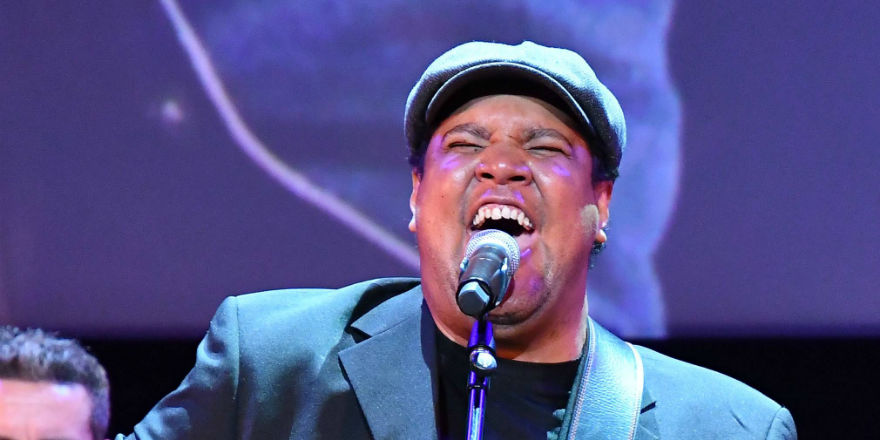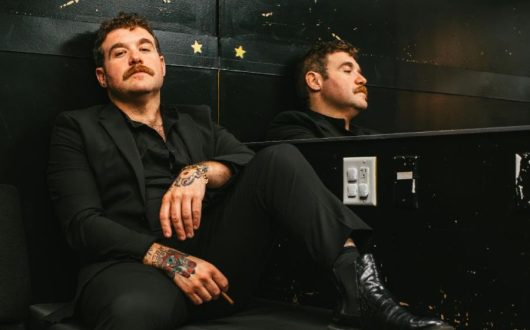Interview By Robert Cavuoto
Chris Pierce has just released his newest CD on September 15th, titled You’ve Got to Feel It. The 12 re-imagined, iconic soul covers were recorded in soul music’s “promised land” — Muscle Shoals, Alabama with the legendary Swampers, Muscle Shoals Horns and Shoals Sisters – those who defined the classic R&B soul sound in its 60’s and 70’s heyday. The first single, Wilson Pickett’s classic “Don’t Fight It,” features background vocals by Grateful Dead member Donna Jean Godchaux, and provides the key inspirational lyric that became the album’s title and muse.
I caught up with Chris to talk about the song selection process for the CD and the magic of recording in Muscle Shoals, Alabama.
Robert Cavuoto: Tell me about the decision to cover these tremendous songs for your CD?
Chris Pierce: David Resnik, who produced the CD, called me to ask if I had ever seen the Muscle Shoals documentary. I told him I did. He went on to say that he knew those guys through a producer, Steve Bassett. David said to “pick three songs and let’s go down there to record them!” Steve Bassett co-produced and played keys and piano on the CD.
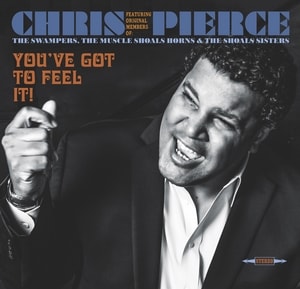
The first song I picked to record was “Cry to Me” which Bert Berns wrote, and Solomon Burke made famous. I had sung that song many times over the years so I knew I would be comfortable with it. I also grew up on it as it, was one of my parent’s favorites. I can’t recall the other two songs off hand, but we went down with them, as well as a few others in our pocket, just in case. We also wanted to pick songs that we knew the guys and gals at Muscle Shoals had played on the original versions. The three songs were done in a couple of hours, as I sang live with the rhythm section. Everyone said, “Let’s do three more!” So we ended up doing six songs on that first trip. When we got together again, we really dug down and did “Stop” the Howard Tate tune, and we had to do the Clarence Carter tune “Slip Away,” because these guys all played with Clarence in the past. We knew we could get them done in the allotted amount of time.
Robert Cavuoto: You really make these covers your own. Was that a conscious decision?
Chris Pierce: Not really. The rhythm section made me feel welcome in a beautiful way. That thing that people talk about when you drive into Muscle Shoals, Alabama is that magic and spirit. For me, it happened, and I felt so good. Looking out from the vocal booth and seeing those guys do their thing was inspiring. These guys showed up with their homemade food, which they put in the kitchen for lunchtime to share. Not only was I excited to play and sing with the folks I grew up listening to, but even more thrilled with how it felt. The only pressure I put on myself, was to be myself. To let all the influences I had grown up listen come out. I didn’t have to do more than two takes for each song.
Robert Cavuoto: Tell me a little about the history and significance of Muscle Shoals?
Chris Pierce: Muscle Shoals, Alabama wasn’t a well-known place in the soul and R&B’s world. The places for that were Detroit, Memphis, and Chicago. Back in the day, these guys got together and started a movement down in Alabama. They said, “let’s get a rhythm section together and start playing and recording.” They became icons because they started playing on some of the biggest R&B hits of the day. At a time when there was such a huge problem with race relations, and some would argue that there still is; a lot of people didn’t know what these players looked like. There was no internet to look up to see that the bass player David Hood who played that great bass line on “I’ll Take You There” is a white dude from Alabama. [Laughing]. I think a lot of people were surprised when they found out. Wilson Pickett told a story that when he showed up to record, he asked, “Ok, where’s the band?” They all started at FAME Studio and then started their own studio, Muscle Shoals Sound Studio. Not only did they play a lot of R&B hits, they also played a lot incredible classic rock.
Going into the late 60’s and 70’s they recorded “Sweet Home Alabama” and got their nickname “The Swampers.” Some of these players are still around today doing their thing.
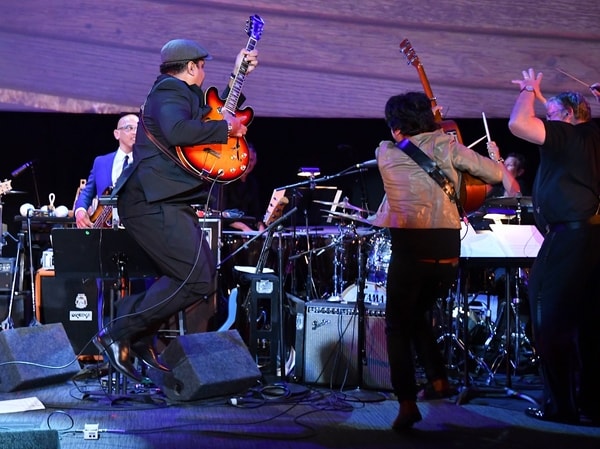
Robert Cavuoto: Do you have a favorite track on the CD?
Chris Pierce: Oh man, that’s tough. The song that I tend to put on repeat is “Trouble Man” by Marvin Gaye. It’s hard for anyone to cover Marvin, so if you are going to do a song, pick one that none of these players had played on, as he was a Motown thing. That tune turned out cool.
Robert Cavuoto: How long did it take to complete the recording of all the songs?
Chris Pierce: It was completed in a total of six days – three days for each time I went down there. The formula was for me and the rhythm section to be recorded on the first day, horns the second day, and background vocals on the third day. We did that twice, with six tunes on each trip. It’s the old school way of doing it. Everyone gets in there, does their thing, and commits.
Dave, Steve, and I are big believers in capturing the rawness of the moment. There was never any discussion of doing 18 takes to find the perfect one. We did most of these songs in two takes. The question they would ask; “Can you all feel that? Ok cool, let’s move on.” [laughing]
Robert Cavuoto: Did you play guitar on the CD?
Chris Pierce: I didn’t, that was a conscious decision. I’m sitting there with some great guitarists like Jimmy Johnson, Will McFarlane, Kelvin Holly, and David Resnik thinking to myself; “I really don’t need to play guitar! Just let me get in the vocal booth and sing [laughing].” I only picked up the guitar in the control room once when I was learning a bridge to a song. Other than that I didn’t record any guitars which were liberating so I could focus on singing. I’m looking forward to doing another guitar record soon.
Robert Cavuoto: I noticed you don’t use a guitar pick when playing, how did that technique come about?
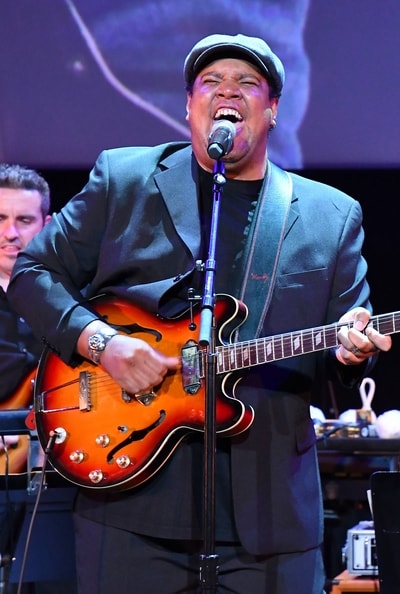
Chris Pierce: My godmother gave me a classical guitar when I was seven or eight. She passed it down to me from when she was young. When I first started learning, I was mimicking classical stuff and wasn’t using a pick. I didn’t get into strumming until much later when I started writing songs. The feeling of not playing with a pick was the first thing I did and soon became natural to me. It still is. People trip out on the way my hand is [laughing]. Sometimes I’ll look at videos thinking that is a wacky style [laughing]. It feels right to me, and I can get a lot of character out of the guitar.
Robert Cavuoto: What do you want your fans to take away from this CD?
Chris Pierce: I hope to introduce this type of great music to people who maybe don’t know it, and to remind people there is great soul music out there. Also, that there were people who sacrificed so much, and spent much of their lives making this great music. Most of these folks just got paid for the session and never saw another penny. I want to make sure people know their names, their history, and how much of an effect they had on popular music in America.
I did a show at a festival the other day, and this 15-year-old boy came up to me to buy my CD. I sold it to him, and the next day he came back because we were headlining the festival. He told me he loved it. He went on to tell me that I was a great songwriter [laughing]. I looked at him and told him to sit down as I said, “Let me tell you about these songs. I didn’t write any of them, but I want you to know about them.” I’m hoping the younger folks will get into it too. I’m hoping parents will share it with their kids and maybe this 15-year-old kid will share them with his friends, so soul music will live on.
https://www.facebook.com/iamchrispierce/
